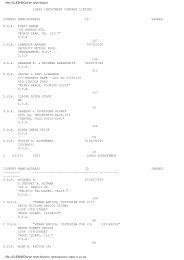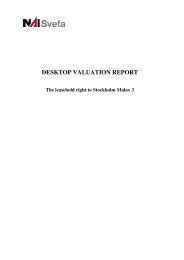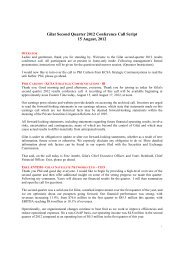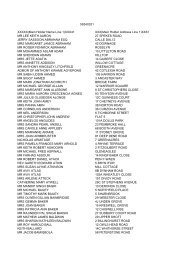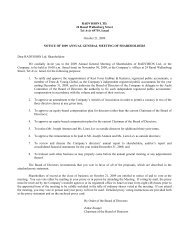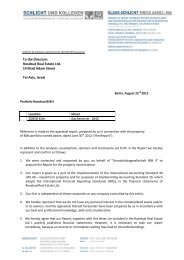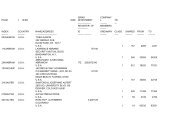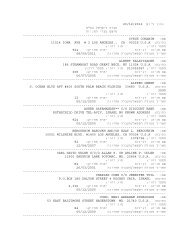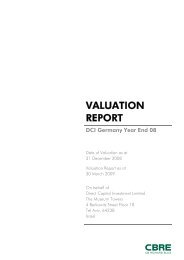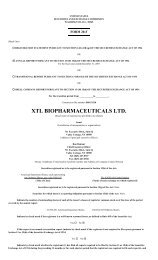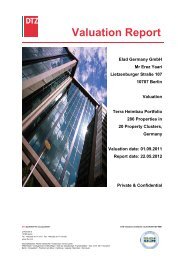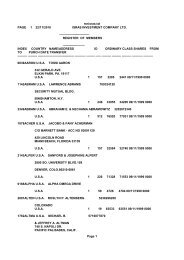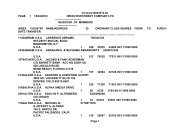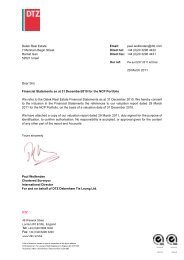RETALIX LTD.
RETALIX LTD.
RETALIX LTD.
Create successful ePaper yourself
Turn your PDF publications into a flip-book with our unique Google optimized e-Paper software.
<strong>RETALIX</strong> <strong>LTD</strong>.<br />
NOTES TO CONSOLIDATED FINANCIAL STATEMENTS (continued)<br />
NOTE 1 – SIGNIFICANT ACCOUNTING POLICIES (continued):<br />
r. Advertising expenses:<br />
These costs are charged to selling and marketing expenses as incurred. Advertising expenses totaled $2,716,872, $1,368,000 and<br />
$938,000 in the years ended December 31, 2005, 2004 and 2003, respectively.<br />
s. Derivative financial instruments:<br />
The Company has only limited involvement with foreign exchange derivative financial instruments (forward exchange<br />
contracts). These contracts do not qualify for hedge accounting under U.S. GAAP. As a result, changes in the fair value of<br />
derivatives are reflected in the statements of income and included in “financial expenses - net”.<br />
t. Sale of receivables:<br />
The Company factors some of its trade receivables. The factoring is effected through banks, on a non-recourse basis. The<br />
transfer of accounts receivable qualify as a sales transaction under the provisions of FASB Statement No.140, “Accounting for<br />
Transfers and Servicing of Financial Assets and Extinguishments of Liabilities” (“FAS 140”). The resulting costs are charged to<br />
financial expenses - net, as incurred. The expenses resulting from these sales in the years ended December 31, 2005 and 2004<br />
amounted to $1,835,512 and $658,000, respectively, and are included in financial expenses.<br />
u. Recently issued accounting pronouncements:<br />
1) In December 2004, the FASB issued Statement No. 123 (revised 2004), “Share-Based Payment” (FAS 123(R)). FAS 123<br />
(R) will provide investors and other users of financial statements with more complete and neutral financial information<br />
by requiring that the compensation cost relating to share-based payment transactions be recognized in financial<br />
statements. That cost will be measured based on the fair value of the equity or liability instruments issued. FAS 123(R)<br />
covers a wide range of share-based compensation arrangements including share options, restricted share plans,<br />
performance-based awards, share appreciation rights and employee share purchase plans. FAS 123(R) replaces SFAS<br />
No. 123, “Accounting for Stock-Based Compensation” (FAS 123), and supersedes APB No. 25, “Accounting for Stock<br />
Issued to Employees” (APB 25). FAS 123, as originally issued in 1995, established as preferable a fair-value-based<br />
method of accounting for share-based payment transactions with employees. However, that Statement permitted entities<br />
the option of continuing to apply the guidance in APB 25, as long as the footnotes to financial statements disclosed what<br />
net income would have been had the preferable fair-value-based method been used. The Company will be required to<br />
apply FAS 123(R) as of the first annual reporting period that begins after June 15, 2005. As permitted by FAS 123, the<br />
Company currently accounts for share-based payments to employees using APB 25’s intrinsic value method.<br />
Accordingly, the adoption of FAS 123(R)’s fair value method will have a significant impact on the Company’s result of<br />
operations, although it will have no impact on its overall financial position. The Company plans to adopt FAS 123(R)<br />
using the “modified prospective” method. The “modified prospective” method requires compensation cost to be<br />
recognized beginning with the effective date (a) based on the requirements of FAS 123(R) for all share-based payments<br />
granted after the effective date and (b) based on the requirements of FAS 123 for all awards granted to employees prior<br />
to the effective date of FAS 123(R) that remain unvested on the effective date. The impact of adoption of FAS 123(R) on<br />
future periods cannot be predicted at this time because it will depend on levels of share-based payments granted in the<br />
future. However, had the Company adopted FAS 123(R) in prior periods, the impact of that standard would have<br />
approximated the impact of FAS 123 as described in the disclosure of pro forma net income and earnings per share in<br />
Note 1(q) to the financial statements.<br />
F-18



